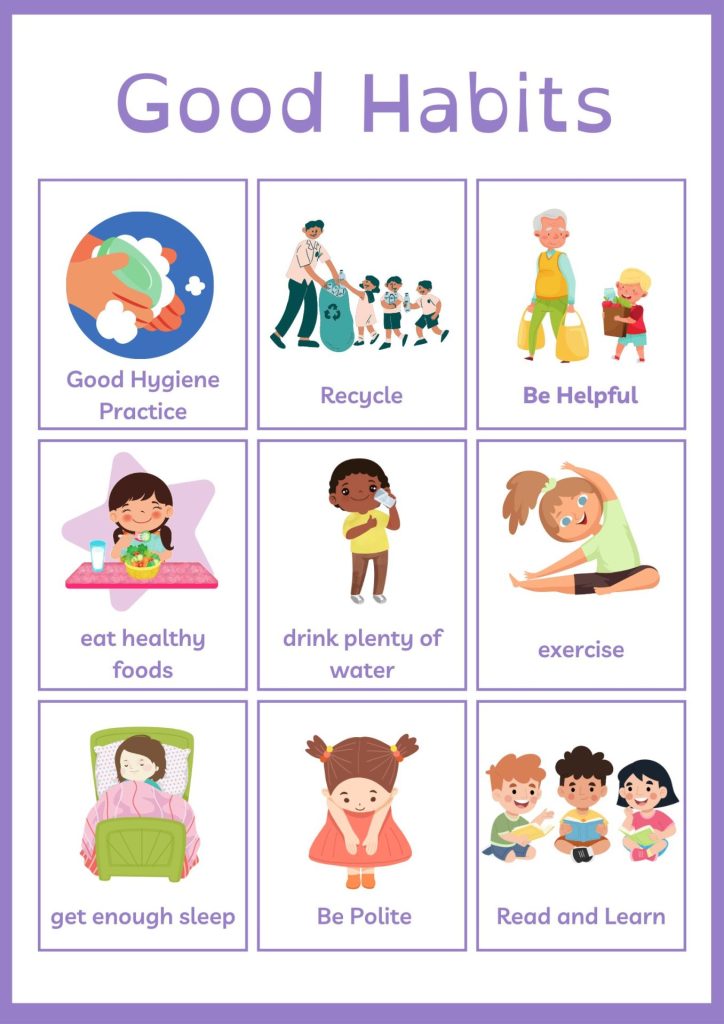How to Develop Good Habits for Kids? – Activities & Tips
Introduction
Understanding Good Habits for Kids
In the formative years of childhood, the development of good habits plays a pivotal role in shaping a child’s character and future. Let’s explore the significance of good habits for kids and the positive impact they have on their overall well-being.
Analogy of Definition
What are Good Habits?
Good habits for kids encompass a range of behaviors and practices that contribute to their physical, mental, and emotional well-being. These habits are essential for fostering a positive and productive lifestyle from an early age.
Method
Instilling Good Habits
Developing good habits for kids is essential for their overall growth and well-being. These habits form the foundation of their future behaviors and lifestyle choices. As parents and caregivers, our role is crucial in guiding and supporting children in cultivating these positive habits. This article explores various good habits that children should adopt and provides practical ways for parents to help their kids practice and reinforce these habits effectively. From healthy eating and physical activity to respectful communication and environmental awareness, fostering these behaviors will help children lead healthy, responsible, and fulfilling lives.
1. Healthy Eating Habits
Good Habit: Encourage a balanced diet rich in fruits, vegetables, whole grains, and lean proteins.
Parental Role:
- Lead by Example: Eat healthy foods yourself.
- Involve Kids in Cooking: Let them help with meal prep to learn about nutritious foods.
- Create a Routine: Establish regular meal and snack times.
2. Regular Physical Activity
Good Habit: Engage in at least 60 minutes of physical activity daily.
Parental Role:
- Family Activities: Plan family outings that involve physical activities like hiking, biking, or playing sports.
- Limit Screen Time: Set limits on sedentary activities such as watching TV or playing video games.
- Encourage Play: Provide opportunities and space for kids to play outdoors.
3. Good Hygiene Practices
Good Habit: Maintain regular personal hygiene, including brushing teeth, washing hands, and bathing.
Parental Role:
- Demonstrate Proper Techniques: Show them how to brush teeth and wash hands properly.
- Make it Fun: Use songs or games to make these routines enjoyable.
- Routine Checks: Ensure they follow these habits regularly, especially after activities like playing outside or before meals.
4. Respectful Communication
Good Habit: Speak politely and listen to others.
Parental Role:
- Model Respect: Use polite language and active listening when interacting with your child and others.
- Teach Empathy: Discuss the importance of understanding and respecting others’ feelings.
- Praise Positive Behavior: Acknowledge and praise respectful communication to reinforce the behavior.
5. Responsibility and Independence
Good Habit: Complete age-appropriate tasks and take responsibility for personal belongings.
Parental Role:
- Assign Chores: Give them simple tasks like making their bed or helping set the table.
- Offer Choices: Allow them to make decisions to foster independence.
- Provide Encouragement: Support their efforts and provide guidance when needed.
6. Time Management
Good Habit: Prioritize tasks and manage time effectively.
Parental Role:
- Create Schedules: Help them make a daily or weekly schedule for schoolwork, chores, and playtime.
- Set Goals: Encourage setting small, achievable goals and celebrate when they accomplish them.
- Teach Time-Tracking: Use timers or alarms to help them understand time management.
7. Reading and Learning
Good Habit: Cultivate a love for reading and continuous learning.
Parental Role:
- Read Together: Set aside time for reading together daily.
- Library Visits: Make regular trips to the library to explore new books.
- Encourage Curiosity: Support their interests and provide resources for learning.
8. Environmental Awareness
Good Habit: Practice eco-friendly habits like recycling and conserving water.
Parental Role:
- Teach Conservation: Explain the importance of saving water and energy.
- Recycling Projects: Engage in recycling activities and projects together.
- Nature Activities: Spend time in nature to foster an appreciation for the environment.
By incorporating these strategies, parents can effectively guide their children in developing and maintaining good habits that will benefit them throughout their lives.

Examples
Good Habits for Kids 1: Maintaining Personal Hygiene
Scenario: Encouraging kids to brush their teeth twice a day and wash their hands before meals.
Good Habits for Kids 2: Following a Regular Study Routine
Scenario: Establishing a daily study schedule and providing a designated study area for completing homework and assignments.
Good Habits for Kids 3: Eating Healthy Meals
Scenario: Introducing a variety of nutritious foods and snacks to promote healthy eating habits.
The examples illustrate the importance of instilling good habits in kids, such as maintaining personal hygiene, following a regular study routine, and eating healthy meals. These habits contribute to the overall well-being and development of children, setting the stage for a positive and successful future.
Real life application
Story: The Adventures of Lily and Ethan
Lily and Ethan, two young siblings, embarked on a journey filled with opportunities to practice good habits and learn valuable life lessons.
Scenario 1: The Kindness Challenge
Lily and Ethan encountered a classmate who was feeling upset. Remembering the habit of practicing kindness, they offered their support and comfort, making a positive impact on their friend’s day.
Scenario 2: The Healthy Eating Quest
During a family trip to the grocery store, Lily and Ethan actively participated in choosing nutritious foods, demonstrating their good habit of making healthy meal choices.
Scenario 3: The Study Adventure
As part of their daily routine, Lily and Ethan diligently completed their homework and engaged in educational activities, showcasing their commitment to following a regular study routine.
FAQ's
Like? Share it with your friends
